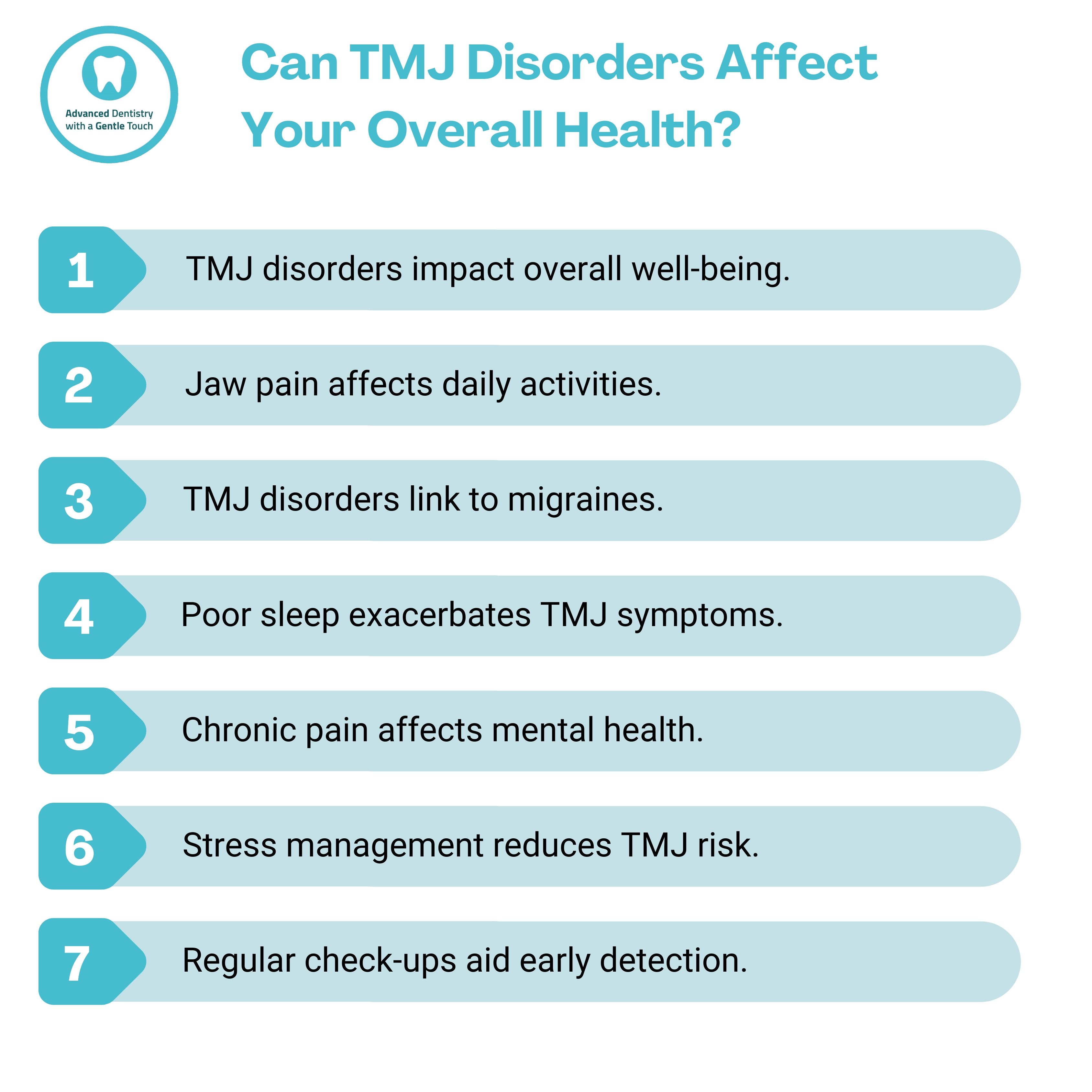TMJ disorders play a crucial role in affecting overall well-being in dental and medical health, The TMJ, or temporomandibular joint disorder, connects the jawbone to the skull and allows for movements essential for chewing, speaking, and other functions. When issues arise in this joint, they result in what is known as a TMJ disorder. Common symptoms of TMJ disorders include jaw pain, difficulty chewing, clicking or popping sounds in the jaw, and headaches.
These disorders, ranging from mild discomfort to severe pain, can significantly impact daily activities and quality of life. Understanding TMJ disorders is not just about addressing jaw-related issues but also about recognizing their broader health implications. They are often linked to other symptoms such as TMJ/TMD, headaches, ear pain, and even migraines. This understanding can help us empathize with those who are dealing with the challenges of TMJ disorders.
By exploring the connection between TMJ disorders and overall health, we can gain insights into how these conditions affect various aspects of our well-being beyond the jaw. This discussion not only sets the stage for a deeper look into the far-reaching effects of TMJ disorders but also highlights the role we play in managing these conditions. Our proactive approach can make a significant difference in our overall health.

What Are TMJ Disorders?
Definition and Anatomy
TMJ disorders refer to a group of conditions that affect the temporomandibular joint, which connects the jawbone to the skull. This joint is responsible for the movements necessary for speaking, chewing, and facial expressions. When it functions normally, the TMJ operates smoothly, enabling pain-free movement. Understanding this anatomy and definition can provide clarity and knowledge about TMJ disorders.
However, TMJ disorders disrupt this harmony, leading to pain and restricted motion. Understanding TMJ is crucial for recognizing the broader impact of these disorders. Essentially, these disorders involve issues with the muscles and joints in the jaw, which can manifest as clicking or popping sounds, jaw stiffness, and difficulty fully opening the mouth.
Causes and Risk Factors
The causes of TMJ disorders are varied and can include genetic predispositions, arthritis, jaw injuries, and particularly teeth grinding, known as bruxism. Bruxism is the habitual grinding or clenching of teeth, often during sleep, which puts excessive strain on the TMJ.
Other contributing factors include stress, which can lead to muscle tension around the jaw and misalignment of the teeth or jaw. Additionally, certain risk factors increase the likelihood of developing TMJ disorders.
These include a family history of TMJ problems, previous jaw trauma, and conditions like rheumatoid arthritis. Addressing these causes and risk factors is essential in determining how to cure TMJ permanently. For those experiencing acute symptoms, seeking immediate help from an emergency dentist in New Jersey like Dr Korwin can provide relief and prevent further complications.

Link Between TMJ Disorders and Headaches
TMJ disorders are known to cause significant TMJ head pain and TMJ headaches. These conditions often result in tension headaches and migraines due to the proximity of the temporomandibular joint to major nerve pathways. When the joint is misaligned or inflamed, it can irritate nearby nerves, leading to persistent pain.
Muscle tension in the jaw, face, and neck further contributes to these headaches. Understanding the symptoms of TMJ disorder that lead to TMJ headaches is crucial for effective treatment. The physiological mechanisms involved include continuous muscle strain and nerve irritation, which trigger headaches that can severely affect daily life.
Effects on Sleep Quality
The impact of TMJ disorders extends beyond waking hours, significantly affecting sleep quality. Individuals often experience sleep disturbances in TMJ, including sleep apnea, due to the discomfort and pain caused by the condition. This disruption in sleep patterns can lead to chronic fatigue, increased stress levels, and a weakened immune system.
Poor sleep quality exacerbates TMJ symptoms, creating a vicious cycle that further deteriorates overall health. Addressing these symptoms through effective treatment is essential for improving sleep and, consequently, overall well-being.
Connection to Mental Health
Chronic pain from TMJ disorders is closely linked to mental health issues such as anxiety and depression. Persistent discomfort and pain can significantly impact an individual's quality of life, leading to emotional distress. Research shows that managing TMJ symptoms can have a positive effect on mental well-being.
Effective treatment not only alleviates physical pain but also helps reduce the psychological burden associated with chronic conditions. By addressing both the physical and mental aspects of TMJ disorders, individuals can experience improved overall health and a better quality of life.
Recognizing the Symptoms of TMJ-Related Health Issues
Common Symptoms of TMJ Disorders
TMJ disorder symptoms can vary widely but often include jaw pain, clicking or popping sounds when opening or closing the mouth, and limited jaw movement. These symptoms are key indicators of underlying TMJ disorders, which affect the temporomandibular joint connecting the jawbone to the skull.
Individuals may experience discomfort when chewing or speaking, and the jaw may even become locked in an open or closed position. Recognizing these primary symptoms early is crucial for diagnosing and treating TMJ disorders effectively, as they can significantly impact daily activities and overall quality of life.
Secondary Symptoms and Health Issues
In addition to the primary symptoms, TMJ disorders can lead to a range of secondary health issues. For instance, individuals might experience earaches, neck pain, and dizziness, which are less commonly associated with jaw problems but can be equally disruptive.
Another secondary symptom often associated with TMJ disorders is a headache from clenching jaw muscles. Moreover, TMJ nerve damage symptoms such as tingling or numbness in the face can occur due to the proximity of the temporomandibular joint to various nerve pathways.
Recognizing these secondary symptoms is essential for early diagnosis and comprehensive treatment. They often indicate the extent of the disorder and help guide effective management strategies. Early intervention can prevent the progression of these symptoms and improve overall health outcomes.

Evaluating and Addressing TMJ Disorders
Diagnostic Procedures
Diagnosing TMJ disorders involves a thorough and systematic approach to ensure accurate identification and effective treatment. The diagnostic process typically begins with a detailed physical examination by a healthcare provider, which includes palpating the jaw muscles and joints to detect any abnormalities or pain.
Dental X-rays are commonly used to visualize the structure of the jaw and teeth, identifying any misalignments or damage. In more complex cases, MRI scans may be utilized to provide detailed images of the soft tissues around the temporomandibular joint, offering a clearer picture of the extent of the disorder.
A comprehensive medical history is crucial during diagnosis, as it helps the healthcare provider understand any underlying factors contributing to the condition, such as previous injuries, TMJ disorder exercises, or habits like teeth grinding.
Comprehensive Treatment Plans
Medications
Treating TMJ disorders often requires a multifaceted approach tailored to the individual's specific needs. Medications play a significant role in managing pain and inflammation associated with these disorders.
Common medications include pain relievers, muscle relaxants, and anti-inflammatory drugs, which help reduce discomfort and improve jaw function. For immediate relief, visiting an urgent care dentist can provide quick pain management solutions and temporary measures until a comprehensive treatment plan is established.
Therapies
Therapies are another cornerstone of TMJ disorder treatment. Physical therapy, through targeted exercises, can help strengthen the jaw muscles, improve range of motion, and alleviate pain.
Stress management techniques, such as mindfulness and relaxation exercises, are also beneficial as they reduce muscle tension that exacerbates TMJ symptoms. Dental treatments, such as custom-fitted mouthguards, can prevent teeth grinding (bruxism) and protect the jaw from further damage.
Lifestyle adjustments
Lifestyle adjustments are essential for the long-term management of TMJ disorders. Adopting a soft diet can minimize strain on the jaw while incorporating regular exercise and maintaining good posture can enhance overall physical health. Proper posture can reduce the pressure on the jaw and neck muscles, promoting better alignment and function.
Surgical Interventions
In severe cases where conservative treatments fail, surgical interventions may be considered. Surgical procedures such as arthroscopy or open-joint surgery can address structural issues within the temporomandibular joint, providing relief from chronic pain and improving jaw function.
However, surgery is typically seen as a last resort after all other treatment options have been exhausted. For those experiencing acute symptoms or complications, seeking help from an emergency dentist in New Jersey can be crucial. Immediate attention can prevent the escalation of symptoms and provide necessary interventions, such as TMJ headache relief.

Strategies for Maintaining TMJ Health
Preventive Measures
Preventing TMJ disorders begins with adopting healthy lifestyle habits. Maintaining good posture is essential, as it helps keep the jaw aligned properly, reducing unnecessary strain on the temporomandibular joint. Avoiding excessive jaw movements, such as chewing gum or clenching teeth, can also help prevent the onset of TMJ disorders.
Stress management techniques, like mindfulness and relaxation exercises, play a significant role in preventing TMJ issues. Reducing stress can decrease muscle tension around the jaw, minimizing the risk of developing TMJ problems. Consulting with a dentist in Middletown, NJ, for advice on preventive measures can further aid in maintaining TMJ health.
Ongoing Care and Self-Management
Regular dental check-ups are crucial for the early detection and management of TMJ disorders. Dentists can identify signs of TMJ issues before they become severe, allowing for timely intervention. Self-care practices, such as gentle jaw exercises and applying warm compresses, can alleviate minor symptoms and maintain jaw health.
Long-term strategies, including proper diet, regular physical activity, and avoiding habits like teeth grinding, contribute to overall well-being and TMJ health. For specialized care, visiting a TMJ specialist in New Jersey ensures comprehensive management and treatment plans tailored to individual needs.
Conclusion
In summary, TMJ disorders have a significant impact on overall health, affecting not only the jaw but also causing headaches, sleep disturbances, and even mental health issues. Preventive measures, such as maintaining good posture and managing stress, play a vital role in avoiding these disorders.
Ongoing care, including regular dental check-ups and self-management techniques, is essential for maintaining jaw health. If you suspect TMJ problems, seeking proper diagnosis and treatment can improve your overall well-being.
Consult with your healthcare provider or a Red Bank dentist like Dr. Korwin to address any TMJ-related health issues and follow recommended strategies for prevention and TMJ treatment. By taking proactive steps, you can manage and potentially prevent the complications associated with TMJ disorders, ensuring a healthier, more comfortable life.




